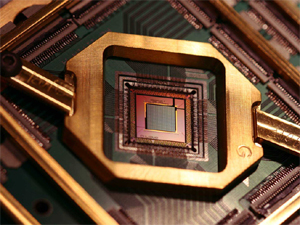



Date:12/05/17
 A team of researchers from the Department of Applied Physics at Aalto University in Finland has invented a quantum-circuit refrigerator, which can reduce errors in quantum computing.
A team of researchers from the Department of Applied Physics at Aalto University in Finland has invented a quantum-circuit refrigerator, which can reduce errors in quantum computing.
“How quantum computers differ from the computers that we use today is that instead of normal bits, they compute with quantum bits (qubits),” the physicists said.
“The bits being crunched in your laptop are either zeros or ones, whereas a qubit can exist simultaneously in both states. This versatility of qubits is needed for complex computing, but it also makes them sensitive to external perturbations.”
Just like ordinary processors, quantum computers also need a cooling mechanism.
“In the future, thousands or even millions of logical qubits may be simultaneously used in computation, and in order to obtain the correct result, every qubit has to be reset in the beginning of the computation,” they said.
“If the qubits are too hot, they cannot be initialized because they are switching between different states too much.”
This is the problem Aalto University physicists Mikko Möttönen, Kuan Yen Tan and co-authors have developed a solution to.
The nanoscale refrigerator invented by the team solves a massive challenge: with its help, most electrical quantum devices can be initialized quickly. The devices thus become more powerful and reliable.
“I have worked on this gadget for five years and it finally works,” Tan said.
The team cooled down a qubit-like superconducting resonator utilizing the tunneling of single electrons through a 2-nm-thick insulator.
The authors gave the electrons slightly too little energy from an external voltage source than what is needed for direct tunneling.
Therefore, the electron captures the missing energy required for tunneling from the nearby quantum device, and hence the device loses energy and cools down.
The cooling can be switched off by adjusting the external voltage to zero.
Then, even the energy available from the quantum device is not enough to push the electron through the insulator.
“Our refrigerator keeps quanta in order,” Dr. Möttönen said.
“We now plan to cool actual quantum bits in addition to resonators and want to lower the minimum temperature achievable with the refrigerator and make its on/off switch super fast.”
The research is published in the journal Nature Communications.
Researchers Invent Nanoscale ‘Refrigerator’ for Quantum Computers
 A team of researchers from the Department of Applied Physics at Aalto University in Finland has invented a quantum-circuit refrigerator, which can reduce errors in quantum computing.
A team of researchers from the Department of Applied Physics at Aalto University in Finland has invented a quantum-circuit refrigerator, which can reduce errors in quantum computing.“How quantum computers differ from the computers that we use today is that instead of normal bits, they compute with quantum bits (qubits),” the physicists said.
“The bits being crunched in your laptop are either zeros or ones, whereas a qubit can exist simultaneously in both states. This versatility of qubits is needed for complex computing, but it also makes them sensitive to external perturbations.”
Just like ordinary processors, quantum computers also need a cooling mechanism.
“In the future, thousands or even millions of logical qubits may be simultaneously used in computation, and in order to obtain the correct result, every qubit has to be reset in the beginning of the computation,” they said.
“If the qubits are too hot, they cannot be initialized because they are switching between different states too much.”
This is the problem Aalto University physicists Mikko Möttönen, Kuan Yen Tan and co-authors have developed a solution to.
The nanoscale refrigerator invented by the team solves a massive challenge: with its help, most electrical quantum devices can be initialized quickly. The devices thus become more powerful and reliable.
“I have worked on this gadget for five years and it finally works,” Tan said.
The team cooled down a qubit-like superconducting resonator utilizing the tunneling of single electrons through a 2-nm-thick insulator.
The authors gave the electrons slightly too little energy from an external voltage source than what is needed for direct tunneling.
Therefore, the electron captures the missing energy required for tunneling from the nearby quantum device, and hence the device loses energy and cools down.
The cooling can be switched off by adjusting the external voltage to zero.
Then, even the energy available from the quantum device is not enough to push the electron through the insulator.
“Our refrigerator keeps quanta in order,” Dr. Möttönen said.
“We now plan to cool actual quantum bits in addition to resonators and want to lower the minimum temperature achievable with the refrigerator and make its on/off switch super fast.”
The research is published in the journal Nature Communications.
Views: 510
©ictnews.az. All rights reserved.Similar news
- The mobile sector continues its lead
- Facebook counted 600 million active users
- Cell phone testing laboratory is planned to be built in Azerbaijan
- Tablets and riders outfitted quickly with 3G/4G modems
- The number of digital TV channels will double to 24 units
- Tax proposal in China gets massive online feedback
- Malaysia to implement biometric system at all entry points
- Korea to build Green Technology Centre
- Cisco Poised to Help China Keep an Eye on Its Citizens
- 3G speed in Azerbaijan is higher than in UK
- Government of Canada Announces Investment in Green Innovation for Canada
- Electric cars in Azerbaijan
- Dominican Republic Govt Issues Cashless Benefits
- Spain raises €1.65bn from spectrum auction
- Camden Council boosts mobile security





















